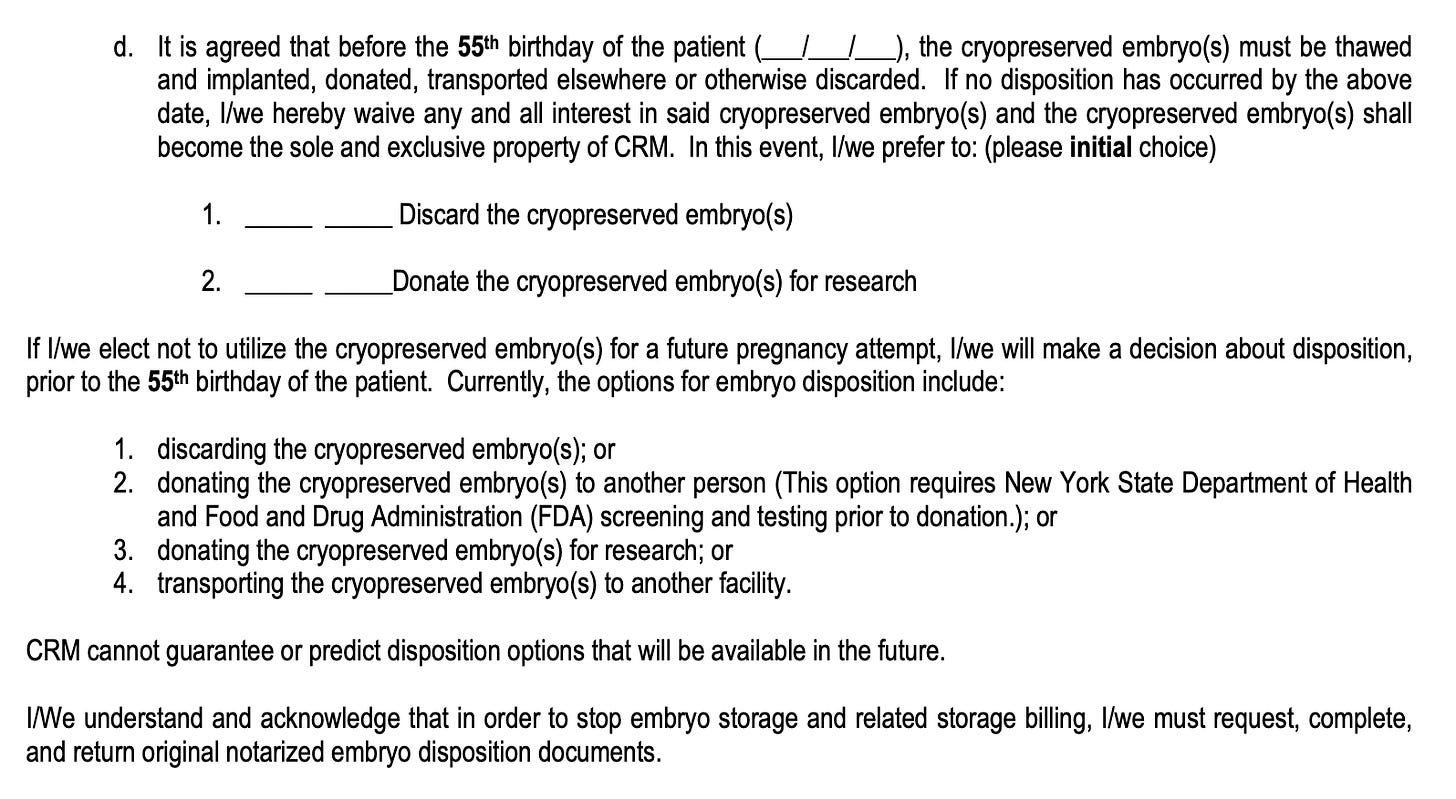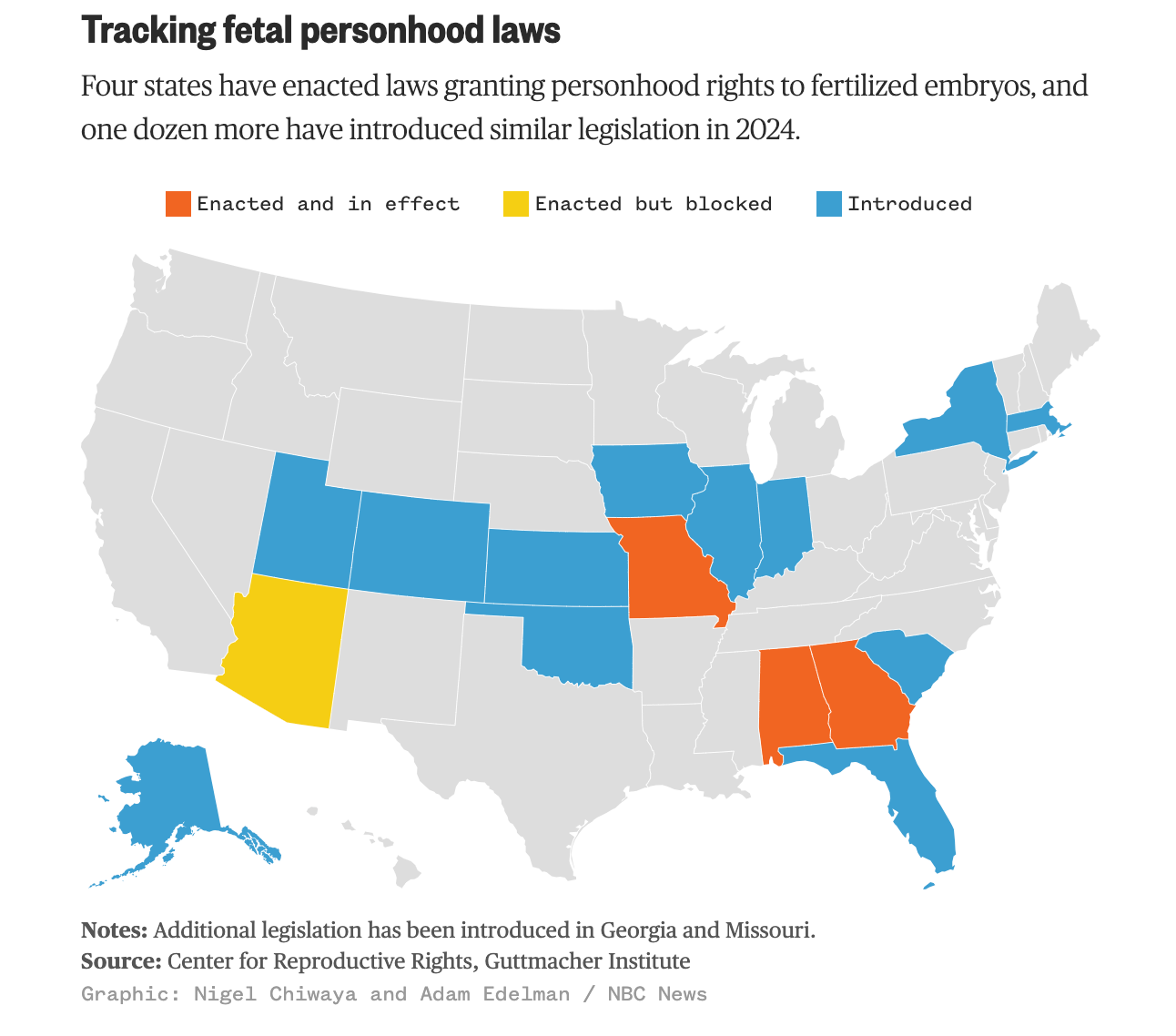If embryos are considered children...
🥚🧊 Wrapping my head around the Alabama embryo ruling along with its medical and policy implications
“If they [embyros] have the same rights as a child who’s born, then that would mean that the government has the same right to take a child away from me if they feel like they’re neglecting or abusing them…And I don’t know what their definition of neglect or abuse when it comes to an embryo would be – maybe being frozen for seven years is neglect in their eyes.” (Source: CNN)
Kristia Rumbley from Birmingham, Alabama still has 3 frozen embryos after having gone through IVF twice and welcoming 3 out of her 4 children. Since the Supreme Court of Alabama ruled on February 16th that embryos are considered children, protected under the “Wrongful Minors Act,” she and her husband don’t know what to do with these unused frozen embryos now that their family is complete.
They’re not alone. There are between 600,000 and 1 million frozen embryos in the US (Source: Stat News). With the new Alabama ruling, what happens if clinics and storage facilities no longer want liability? When I froze my eggs, I signed an informed consent form, which included choosing what would happen to my frozen eggs in the event of my death or past 55 years old. Patients freezing embryos sign a similar informed consent form. I did a Google Search and found copies of consent forms for Weill Cornell Reproductive Medicine in New York and Stanford Medicine Fertility and Reproductive Health in California. Here’s a snapshot of what Weill Cornell’s 2022 IVF Consent Packet states:
The Reality of the Business of IVF
This makes it obvious why 3 Alabama fertility clinics—Center for Reproductive Medicine at Mobile Infirmary, Alabama Fertility, and the University of Alabama at Birmingham—already halted their IVF treatment programs, and 2 major embryo shipping companies, including Cryoport, paused shipping in and out of Alabama (Source: New York Times). The legal risk for clinics and providers is just too high.
Embryo loss is part of the IVF journey, which is what makes the process so heartbreaking for individuals looking to build families when a round of IVF does not work. Only a quarter of fertilized eggs result in an embryo, and the chances of an implanted embryo progressing into a viable pregnancy can be as low as 10% depending on age (Stat News). This means that the more embryos, the higher the chance of pregnancy, which brings us to the topic of embryo storage.
Storing frozen embryos is expensive. Patients often have annual storage fees that can be $1000+ (my egg freezing storage is $1,200/year at Weill Cornell in NYC). If clinics now have to store embryos indefinitely, the costs of running a fertility clinic will be insurmountable for everyone involved. If clinics forego storing embryos, then patients may be forced to transfer them and consider flying in and out of state during treatment. These are only some of the financial considerations that have resulted in fertility clinics pausing operations until they can get clarity, especially on whether embryo loss is associated with civil or criminal penalties. In the meantime though, IVF patients are not only living the emotional and physical rollercoaster of IVF but also thrown into limbo:
Meghan Cole, an IVF patient of Alabama Fertility, asks:
"The clinic is afraid to even release the embryos to us for transfer to another state. I’m like, ‘Well, theoretically, aren’t you kidnapping my children?’" she said. "How far are we taking this? Can I claim them as dependents on my tax return?” (Source: AOL)
Gabrielle Goidel, another IVF Patient of Alabama Fertility, had sought out IVF with her husband after 3 miscarriages. She shares her deliberations now that the clinic has told her they could still proceed with the retrieval but couldn’t guarantee using, storing or shipping her embryos:
“What happens to my embryos after we retrieve them? Do I have to keep those frozen forever? Do I get to let the ones that are genetically abnormal pass naturally? Is my doctor going to be in any sort of danger by doing this procedure to me? There are so many questions in the air right now.” (Source: AOL).
Post-Alabama Policy Fallout
The uncertainty spiral this has created is devastating, especially for Alabama IVF patients trying to build families now only to be told they have to wait until there is more “clarity.” In a week’s time, we’ve seen Alabama lawmakers attempt to “clarify” with a draft bill stating that embryos are not “human life” until implanted in the uterus to now giving doctors who perform IVF immunity from civil and criminal prosecution (Source: Politico). It’s still unclear what they’ll land on.
At the state-level
Fetal personhood bills have been introduced in at least 14 states, an uptick since Roe v. Wade fell in 2022. Using data from The Center for Reproductive Rights, Guttmacher Institute, which advocates for abortion rights, NBC illustrated the following map:
Fetal personhood policy proposals have been an anti-abortion tactic for a long time, but with the overturning of Roe v. Wade and now the Alabama ruling, they prove just how orchestrated the situation is. Florida had already introduced a bill granting a fetus rights as an “unborn child” but decided to hold off in the wake of the backlash from the Alabama ruling (Source: The Washington Post).
For context, frozen embryos have generally been treated by the law as property in most states. Should they be mishandled or destroyed without consent, you may have recourse to sue under destruction of property and/or be entitled to compensation or a settlement (Source: Dr. Natalie Crawford). In 2020, several frozen embryos of three different couples were accidentally dropped and destroyed by another patient of the Alabama fertility clinic. The couples sued the Center for Reproductive Medicine and the Mobile Infirmary Association under Alabama’s Wrongful Death of a Minor Act, which covers fetuses but not embryos. The Alabama Supreme court ruled 8-1 in favor of pursuing a wrongful death lawsuit with the court’s chief justice explaining his ruling beyond just the constitution, choosing to invoke his religion: “Human life cannot be wrongfully destroyed without incurring the wrath of a holy God…even before birth, all human beings have the image of God, and their lives cannot be destroyed without effacing his glory.” (Source: New York Times)
At the federal level
There are a couple bills at play:
The Access to Family Building Act introduced by Congresswoman Susan Wild and Senator Tammy Duckworth (D-IL) in January 2024 that would protect, “would establish a statutory right to access IVF and other ART services, thereby pre-empting any state effort to limit such access and ensuring no hopeful parent—or their doctors—are punished for trying to start or grow a family” (Source: duckworth.senate.gov). Just yesterday, Republicans blocked the bill from passing legislation.
The other related bill introduced over a year ago is the Life at Conception Act that, “defines a ‘human being’ to ‘include each member of the species homo sapiens at all stages of life, including the moment of fertilization or cloning, or other moment at which an individual member of the human species comes into being.’ The bill would also provide equal protection under the 14th Amendment ‘for the right to life of each born and preborn human person.’ (Source: Washington Post)
What Can We Do
I thought about what taking action looks like, and it really does go back to actively staying informed so you can advocate for yourself when things are uncertain. Here’s how we’re thinking about it at MyAdvo:
With your partner and loved ones: Talking out scenarios—what it would take to overcome them, what kind of support do you need. Some questions, I’ve been asking myself recently is, what if we need to get a surrogate? How do we afford it? Could we do it for more than one birth?
With your OB/GYN and Fertility Clinic: Getting in touch with your fertility clinic and asking them if their informed consent forms are planning to change in the future, what their transfer policies are, who are their shipping partners are.
With your vote: This is a big election year. It’s critical to be up to date with your local government (city and state) as well as federal. Take the time to figure out how the officials on your ballot support women’s health rights. Contact your elected officials online or by phone call, especially to communicate your support for The Access to Family Building Act. You can even share your IVF story with a legislator here. Things are moving fast and there will be more to come with the Supreme Court hearing out the abortion pill case this summer.
With your community: Speaking out loud and proud about infertility and IVF—what you’re doing to manage and treat it, how you’re thinking about family planning, how IVF may be a part of that. Let’s normalize fertility assisted treatments instead of feeling ashamed! The more we can share with each other as women, the more we can be a force for one another. The ethos of our Peer Advocate Program is exactly this. You can join us here.
With your money: Save and donate. Save and consider payment plans for future procedures and possible fertility assistance like IVF or surrogacy. Donate to causes like Doctors for Fertility Political Action Committee or Resolve: The National Infertility Association. We’ll keep a lookout for more!
Ultimately, the Alabama ruling sets precedent for how fertility preservation continues to exist in this country, especially as we see more states pass fetal personhood measures and ultimately push for them nationwide. We have to understand that this truly affects everyone and anyone looking to build a family. We have to destigmatize IVF, and any fertility treatment, as a normal and big part of many people’s family planning. Infertility according to the the National Institute of Health is defined as, “when a couple is unable to achieve pregnancy after 1 year of having regular, unprotected sex, or after 6 months if the woman is older than 35 years of age.” (Source: NIH). Causes for male infertility have to do with sperm formation and transport, while for female infertility, it can be much broader:
Failure to ovulate
Problems in the menstrual cycle
Structural Problems of the Reproductive System (ie, a Uterine or Vaginal septum)
Infections
Failure of an egg to mature properly
Implantation Failure
Endometriosis
PCOS
Primary Ovary Insufficiency
Uterine Fibroids
Autoimmune Disorders
What’s more, many of us don’t know about secondary infertility, when you’re unable to conceive or carry to term despite previously giving birth (Source: Penn Medicine). But the median age of new moms in the US is 30 years old, so it’s important to consider the possibility of having trouble conceiving or carrying at an older age.
There’s a piece in The New Yorker this month spotlighting Dr. Caitlin Bernard who has risked her career to perform safe abortions in Indiana. Having seen so much of her work undone with Roe v. Wade falling, her warning call is chilling but motivating. I urge you to join MyAdvo in doing more for women’s health:
“If we just did more, if we just spoke out more, if we were just at the statehouse more,” she recalled thinking, surely legislators would see her patients’ reality and recognize that doctors should be able to support their choices without fear. “Right now,” she said, “it does not feel like that at all.” (Source: The New Yorker).
MyAdvo Monthly Reads
(policy, podcasts, research, trends & more to advocate for yourself)
🔬 New research links PCOS to lower midlife cognitive decline.
⭐️Amy Schumer shuts down trolls about “puffy face” and educates about endometriosis.
🌹 The Bachelor’s Lexi Young opens up about endometriosis and egg freezing
💊 New endometriosis medicine, Ryeqo, approved in the US for marketing to help treat symptoms.
♀Scientists may have found why women get more autoimmune diseases than men.






